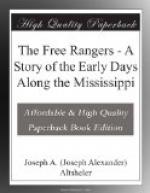The battle suddenly burst forth afresh and with greater violence. All the American twelve pounders were now in a row at the head of the fleet, and one after another, from right to left and then from left to right and over and over again, they began to fire with tremendous rapidity and accuracy at the schooner. All the best gunners were around the twelve pounders. If one fell, another took his place. Many of them were stripped to the waist, and their own fire lighted up their tan faces and their brown sinewy arms as they handled rammer and cannon shot.
The fire of the cannon was supported by that of scores and scores of rifles, and the enemy replied with furious energy. But the supply fleet was animated now by a single purpose. The shiftless one’s simile of a wedge driven into a log was true. No attention was paid to anybody in the hostile boats and canoes. They could fire unheeded. Every American cannon and rifle sent its load straight at the schooner. All the upper works of the vessel were shot away. The men of Alvarez could not live upon its decks; they were even slain at the port holes by the terrific rifle fire; cannon shot, grape shot, and rifle bullets searched every nook and corner of the vessel, and her desperate crew, one by one, began to leap into the water and make for the shores.
A shout of exultation rose from the supply fleet, which was now slowly moving forward. Flames suddenly burst from the schooner and ran up the stumps of her masts and spars, reaching out long arms and laying hold at new points. The cannon shots had also reached the inside of the ship as fire began to spout from the port holes, and there was a steady stream of men leaping from the schooner into the water of the bayou and making for the land.
The American shout of exultation was repeated, and the forest gave back the echo. The Indians answered it with a fierce yell of defiance, and the forest gave back that, too.
But Adam Colfax had been watching shrewdly.
In his daring life he had been in more than one naval battle, and when he saw the schooner wrapped and re-wrapped in great coils and ribbons of flame he knew what was due. Suddenly he shouted in a voice that could be heard above the roar of the battle:
“Back! Back, all! Back for your lives!”
It reached the ears of everybody in the American fleet, and whether he understood its words or not every man understood its tone. There was an involuntary movement common to all. The fleet stopped its slow advance, seemed to sway in another direction, and then to sit still on the water. But all were looking at the schooner with an intense, fascinated, yet horrified gaze.
Nobody was left on the deck of the vessel but the dead. The huge, intertwining coil of fiery ribbons seemed suddenly to unite in one great glowing mass, out of which flames shot high, sputtering and crackling. Then came an awful moment of silence, the vessel trembled, leaped from the water, turned into a volcano of fire and with a tremendous crash blew up.




